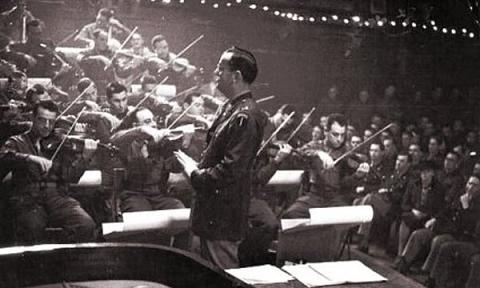For Remembrance Sunday, music of consolation from some who also served…
Last week the inestimable Mahlerman treated us to a quartet of composers once known as ‘the cow-pat school’ – a derisive reference to their thematic interest in the English pastoral. One contemporary (and close friend) of Vaughan Williams not in his post was a composer from Yorkshire of great promise best known for setting to music A E Housman’s collection of poems A Shropshire Lad. He was born George Sainton Kaye Butterworth and died in the Somme as Temporary Lt George Butterworth, MC, shot in the head by a sniper on 5 August 1916, a few weeks after his 31st birthday.
Nobody can know what music we were denied by his death, but we have what we have, and we can share it on the internet. This video contains an excerpt of Loveliest Of Trees (from a Housman poem), sung by baritone John Shirley-Quirk in 1966. Then follows (marked by the second photo) A Shropshire Lad, Rhapsody For Full Orchestra (London Philharmonic Orchestra, 1954).
The great American jazz band leader Glenn Miller was another victim of European war – declared missing in action when his plane disappeared over the English Channel on 15 December 1944. He was on his way to entertain Allied troops in Paris. Miller’s 50-piece Army Air Force Band performed tirelessly for soldiers based in England, playing some 800 times after arriving in the summer of 1944. General Jimmy Doolittle said of Miller’s efforts: “next to a letter from home, that organization was the greatest morale builder in the European Theater of Operations.”
Another tireless entertainer of the troops was Rochdale’s finest, Gracie Fields. This British Pathe newsreel gives a good flavour of a performance in France, but I found the video below strangely moving, for reasons I can’t quite articulate. It may be because she seems to be giving her whole self to her audience. There is no other information about where the show is – if anyone knows, do share in the comments.
Elvis Presley’s insistence on doing national service as a normal private played a part in turning him from hip-thrusting moral menace to American legend. He spent 1958-1960 with the 3rd Armored Division in Friedberg, Germany where he learnt karate, took amphetanines and met his future wife Priscilla, then fourteen years old – despite which, by all accounts, he did a good job of fitting in as an ordinary soldier. My late paternal grandfather had very specific musical tastes: Beethoven’s piano music, Needles and Pins by the Searchers and hymns sung by Elvis, a disparate collection but all fine in themselves. Here is the beautiful Where Could I Go But to the Lord?












Am I imagining things or is the Glenn Miller number the unwitting forerunner of the dreaded ‘go compare’ tune?
I very much liked the second part of the Shropshire Lad, very british modern, and you can’t go wrong with a slow elvis number (unless it’s ‘old shep’)
It is indeed, Worm. Written in 1917 by George M Cohan.
Thanks as ever mahlerman.
Have you seen this?
http://www.youtube.com/watch?v=lDmDBlz1zYc
I’ll take that as a compliment!
Looks like P45 time for me – what a great collection.
Butterworth – unimaginable what he might have given us if that sniper had stayed for another piece of toast.
Gracie – a fixture in our house when I was in short trousers. An instant and lasting rapport with the audience was surely her calling card.
Didn’t care for Elvis – mainly because any girl I was interested in thought the sun shone out of his trousers – which I suppose it did for most of his life. Another life wasted, but this one by his own hand.
You know how it is when you’re preoccupied with some task or concern and the radio is providing background music that is merely a sound, more helpful than silence, and then, no matter how engrossed you are, a piece or passage of music suddenly forces you to sit up straight and consciously listen. Well that happened to me when I first heard Butterworth’s A Shropshire Lad: it happened at about 4 minutes 10 seconds (on this YouTube version) and from that moment I have treasured this man’s meagre output and lamented his early death.
There is, as you state, Brit, something quite moving about the Gracie film. Is it to do with what MM describes as an instant and lasting rapport she established with her audience? Is it the simple lyric of longing for loved ones and home? Is it that we watch knowing that five years of war, death, injury and devastation lay ahead for many in that audience?
Presley was surely the greatest pop/rock performer of them all. The gospel songs, as with your choice here, are beautifully performed, as are the ballads, but it’s the pre-army rock that still draws me back more than any other part of his output. I remember sitting in the local flea pit in 1957, probably waiting to watch a Randolph Scott western, when a trailer for Presley’s Jailhouse Rock came on the big screen. All hell was let loose, especially among the girls; completely ruined my chat-up line with the gorgeous Pauline. But I too quickly became transfixed by the gyrating, ridiculously good-looking bloke who had unknowingly caused something close to a civil disturbance.
Thanks MM and John.
I’d never got the point of Gracie Fields until I watched that video (I don’t really like the timbre of her voice) but yes, “instant and lasting rapport” seems right.
(I should have said, of course, that Gracie was Rochdale’s “second finest”, after my wife…)